How To Write a Concept Paper for Academic Research: An Ultimate Guide
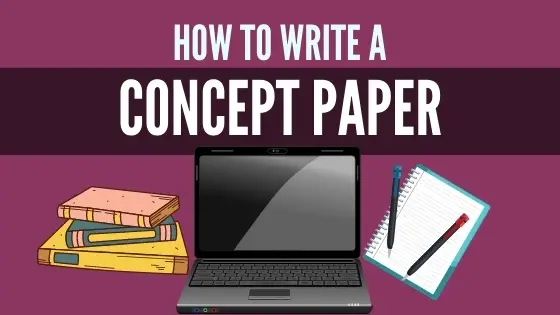
A concept paper is one of the first steps in helping you fully realize your research project. Because of this, some schools opt to teach students how to write concept papers as early as high school. In college, professors sometimes require their students to submit concept papers before suggesting their research projects to serve as the foundations for their theses.
If you’re reading this right now, you’ve probably been assigned by your teacher or professor to write a concept paper. To help you get started, we’ve prepared a comprehensive guide on how to write a proper concept paper.
Related: How to Write Significance of the Study (with Examples)

Table of Contents
What is the concept paper, 1. academic research concept papers, 2. advertising concept papers, 3. research grant concept papers, concept paper vs. research proposal, tips for finding your research topic, 2. think of research questions that you want to answer in your project, 3. formulate your research hypothesis, 4. plan out how you will achieve, analyze, and present your data, 2. introduction, 3. purpose of the study, 4. preliminary literature review, 5. objectives of the study, 6. research questions and hypotheses, 7. proposed methodology, 8. proposed research timeline, 9. references, sample concept paper for research proposal (pdf), tips for writing your concept paper.
Generally, a concept paper is a summary of everything related to your proposed project or topic. A concept paper indicates what the project is all about, why it’s important, and how and when you plan to conduct your project.
Different Types of the Concept Paper and Their Uses

This type of concept paper is the most common type and the one most people are familiar with. Concept papers for academic research are used by students to provide an outline for their prospective research topics.
These concept papers are used to help students flesh out all the information and ideas related to their topic so that they may arrive at a more specific research hypothesis.
Since this is the most common type of concept paper, it will be the main focus of this article.
Advertising concept papers are usually written by the creative and concept teams in advertising and marketing agencies.
Through a concept paper, the foundation or theme for an advertising campaign or strategy is formed. The concept paper can also serve as a bulletin board for ideas that the creative and concept teams can add to or develop.
This type of concept paper usually discusses who the target audience of the campaign is, what approach of the campaign will be, how the campaign will be implemented, and the projected benefits and impact of the campaign to the company’s sales, consumer base, and other aspects of the company.
This type of concept paper is most common in the academe and business world. Alongside proving why your research project should be conducted, a research grant concept paper must also appeal to the company or funding agency on why they should be granted funds.
The paper should indicate a proposed timeline and budget for the entire project. It should also be able to persuade the company or funding agency on the benefits of your research project– whether it be an increase in sales or productivity or for the benefit of the general public.
It’s important to discuss the differences between the two because a lot of people often use these terms interchangeably.
A concept paper is one of the first steps in conducting a research project. It is during this process that ideas and relevant information to the research topic are gathered to produce the research hypothesis. Thus, a concept paper should always precede the research proposal.
A research proposal is a more in-depth outline of a more fleshed-out research project. This is the final step before a researcher can conduct their research project. Although both have similar elements and structures, a research proposal is more specific when it comes to how the entire research project will be conducted.
Getting Started on Your Concept Paper
1. find a research topic you are interested in.
When choosing a research topic, make sure that it is something you are passionate about or want to learn more about. If you are writing one for school, make sure it is still relevant to the subject of your class. Choosing a topic you aren’t invested in may cause you to lose interest in your project later on, which may lower the quality of the research you’ll produce.
A research project may last for months and even years, so it’s important that you will never lose interest in your topic.
- Look for inspiration everywhere. Take a walk outside, read books, or go on your computer. Look around you and try to brainstorm ideas about everything you see. Try to remember any questions you might have asked yourself before like why something is the way it is or why can’t this be done instead of that .
- Think big. If you’re having trouble thinking up a specific topic to base your research project on, choosing a broad topic and then working your way down should help.
- Is it achievable? A lot of students make the mistake of choosing a topic that is hard to achieve in terms of materials, data, and/or funding available. Before you decide on a research topic, make sure you consider these aspects. Doing so will save you time, money, and effort later on.
- Be as specific as can be. Another common mistake that students make is that they sometimes choose a research topic that is too broad. This results in extra effort and wasted time while conducting their research project. For example: Instead of “The Effects of Bananas on Hungry Monkeys” , you could specify it to “The Effects of Cavendish Bananas on Potassium-deficiency in Hungry Philippine Long-tailed Macaques in Palawan, Philippines”.
Now that you have a general idea of the topic of your research project, you now need to formulate research questions based on your project. These questions will serve as the basis for what your project aims to answer. Like your research topic, make sure these are specific and answerable.
Following the earlier example, possible research questions could be:
- Do Cavendish bananas produce more visible effects on K-deficiency than other bananas?
- How susceptible are Philippine long-tailed macaques to K-deficiency?
- What are the effects of K-deficiency in Philippine long-tailed macaques?
After formulating the research questions, you should also provide your hypothesis for each question. A research hypothesis is a tentative answer to the research problem. You must provide educated answers to the questions based on your existing knowledge of the topic before you conduct your research project.
After conducting research and collecting all of the data into the final research paper, you will then have to approve or disprove these hypotheses based on the outcome of the project.
Prepare a plan on how to acquire the data you will need for your research project. Take note of the different types of analysis you will need to perform on your data to get the desired results. Determine the nature of the relationship between different variables in your research.
Also, make sure that you are able to present your data in a clear and readable manner for those who will read your concept paper. You can achieve this by using tables, charts, graphs, and other visual aids.
Related: How to Make Conceptual Framework (with Examples and Templates)
Generalized Structure of a Concept Paper
Since concept papers are just summaries of your research project, they are usually short and no longer than 5 pages. However, for big research projects, concept papers can reach up to more than 20 pages.
Your teacher or professor may give you a certain format for your concept papers. Generally, most concept papers are double-spaced and are less than 500 words in length.
Even though there are different types of concept papers, we’ve provided you with a generalized structure that contains elements that can be found in any type of concept paper.
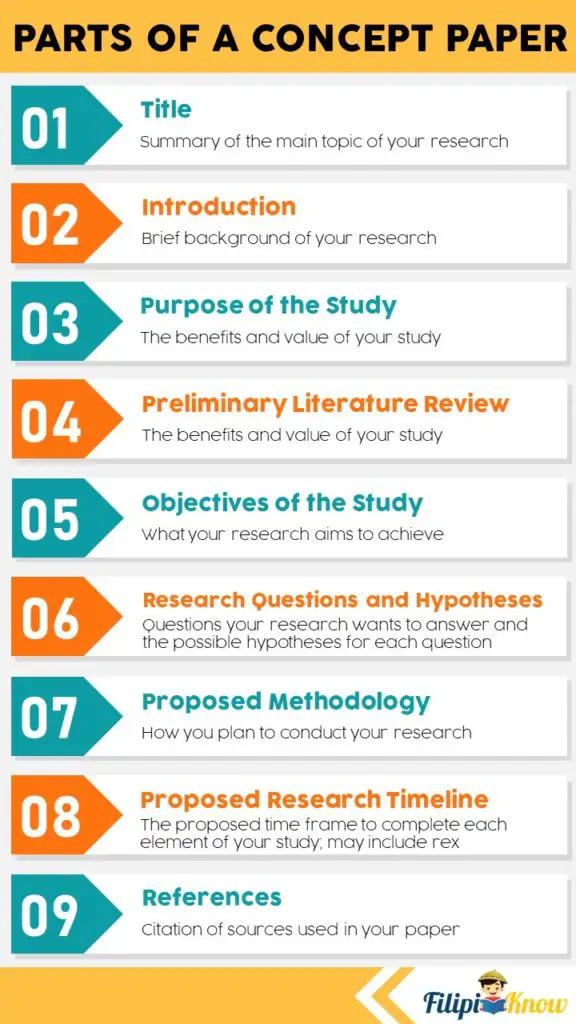
The title for your paper must be able to effectively summarize what your research is all about. Use simple words so that people who read the title of your research will know what it’s all about even without reading the entire paper.
The introduction should give the reader a brief background of the research topic and state the main objective that your project aims to achieve. This section should also include a short overview of the benefits of the research project to persuade the reader to acknowledge the need for the project.
The Purpose of the Study should be written in a way that convinces the reader of the need to address the existing problem or gap in knowledge that the research project aims to resolve. In this section, you have to go into more detail about the benefits and value of your project for the target audience/s.
This section features related studies and papers that will support your research topic. Use this section to analyze the results and methodologies of previous studies and address any gaps in knowledge or questions that your research project aims to answer. You may also use the data to assert the importance of conducting your research.
When choosing which papers and studies you should include in the Preliminary Literature Review, make sure to choose relevant and reliable sources. Reliable sources include academic journals, credible news outlets, government websites, and others. Also, take note of the authors for the papers as you will need to cite them in the References section.
Simply state the main objectives that your research is trying to achieve. The objectives should be able to indicate the direction of the study for both the reader and the researcher. As with other elements in the paper, the objectives should be specific and clearly defined.
Gather the research questions and equivalent research hypotheses you formulated in the earlier step and list them down in this section.
In this section, you should be able to guide the reader through the process of how you will conduct the research project. Make sure to state the purpose for each step of the process, as well as the type of data to be collected and the target population.
Depending on the nature of your research project, the length of the entire process can vary significantly. What’s important is that you are able to provide a reasonable and achievable timeline for your project.
Make sure the time you will allot for each component of your research won’t be too excessive or too insufficient so that the quality of your research won’t suffer.
Ensure that you will give credit to all the authors of the sources you used in your paper. Depending on your area of study or the instructions of your professor, you may need to use a certain style of citation.
There are three main citation styles: the American Psychological Association (APA), Modern Language Association (MLA), and the Chicago style.
The APA style is mostly used for papers related to education, psychology, and the sciences. The APA citation style usually follows this format:
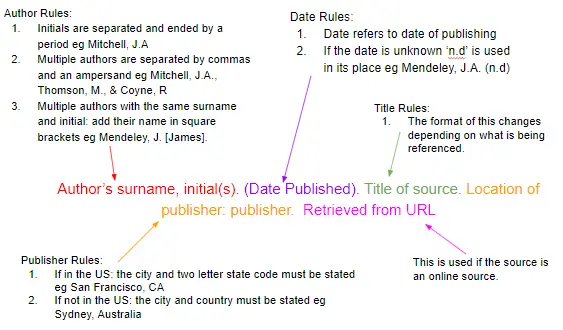
The MLA citation style is the format used by papers and manuscripts in disciplines related to the arts and humanities. The MLA citation style follows this format:
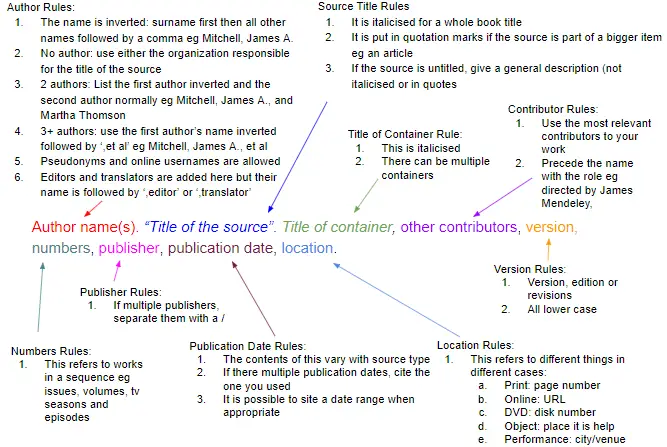
The Chicago citation style is usually used for papers related to business, history, and the fine arts. It follows this citation format:

This is a concept paper sample provided by Dr. Bernard Lango from the Jomo Kenyatta University of Agriculture and Technology (modified for use in this article). Simply click the link above the download the PDF file.
- Use simple, concise language. Minimize the use of flowery language and always try to use simple and easy-to-understand language. Too many technical or difficult words in your paper may alienate your readers and make your paper hard to read.
- Choose your sources wisely. When scouring the Internet for sources to use, you should always be wary and double-check the authenticity of your source. Doing this will increase the authenticity of your research project’s claims and ensure better data gathered during the process.
- Follow the specified format, if any. Make sure to follow any specified format when writing your concept paper. This is very important, especially if you’re writing your concept paper for class. Failure to follow the format will usually result in point deductions and delays because of multiple revisions needed.
- Proofread often. Make it a point to reread different sections of your concept paper after you write them. Another way you can do this is by taking a break for a few days and then coming back to proofread your writing. You may notice certain areas you’d like to revise or mistakes you’d like to fix. Make proofreading a habit to increase the quality of your paper.
Written by Ruth Raganit
in Career and Education , Juander How
Ruth Raganit
Ruth Raganit obtained her Bachelor of Science degree in Geology from the University of the Philippines – Diliman. Her love affair with Earth sciences began when she saw a pretty rock and wondered how it came to be. She also likes playing video games, doing digital art, and reading manga.
Browse all articles written by Ruth Raganit
Copyright Notice
All materials contained on this site are protected by the Republic of the Philippines copyright law and may not be reproduced, distributed, transmitted, displayed, published, or broadcast without the prior written permission of filipiknow.net or in the case of third party materials, the owner of that content. You may not alter or remove any trademark, copyright, or other notice from copies of the content. Be warned that we have already reported and helped terminate several websites and YouTube channels for blatantly stealing our content. If you wish to use filipiknow.net content for commercial purposes, such as for content syndication, etc., please contact us at legal(at)filipiknow(dot)net

Concept Papers in Research: Deciphering the blueprint of brilliance
Concept papers hold significant importance as a precursor to a full-fledged research proposal in academia and research. Understanding the nuances and significance of a concept paper is essential for any researcher aiming to lay a strong foundation for their investigation.
Table of Contents
What Is Concept Paper
A concept paper can be defined as a concise document which outlines the fundamental aspects of a grant proposal. It outlines the initial ideas, objectives, and theoretical framework of a proposed research project. It is usually two to three-page long overview of the proposal. However, they differ from both research proposal and original research paper in lacking a detailed plan and methodology for a specific study as in research proposal provides and exclusion of the findings and analysis of a completed research project as in an original research paper. A concept paper primarily focuses on introducing the basic idea, intended research question, and the framework that will guide the research.
Purpose of a Concept Paper
A concept paper serves as an initial document, commonly required by private organizations before a formal proposal submission. It offers a preliminary overview of a project or research’s purpose, method, and implementation. It acts as a roadmap, providing clarity and coherence in research direction. Additionally, it also acts as a tool for receiving informal input. The paper is used for internal decision-making, seeking approval from the board, and securing commitment from partners. It promotes cohesive communication and serves as a professional and respectful tool in collaboration.
These papers aid in focusing on the core objectives, theoretical underpinnings, and potential methodology of the research, enabling researchers to gain initial feedback and refine their ideas before delving into detailed research.
Key Elements of a Concept Paper
Key elements of a concept paper include the title page , background , literature review , problem statement , methodology, timeline, and references. It’s crucial for researchers seeking grants as it helps evaluators assess the relevance and feasibility of the proposed research.
Writing an effective concept paper in academic research involves understanding and incorporating essential elements:
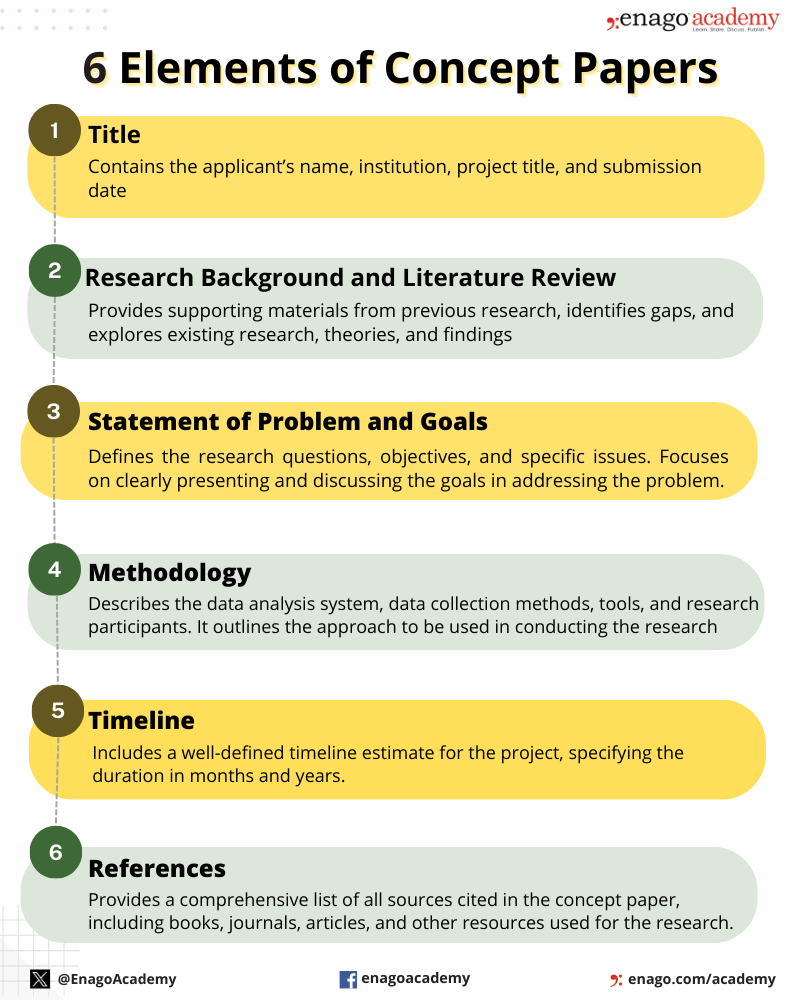
How to Write a Concept Paper?
To ensure an effective concept paper, it’s recommended to select a compelling research topic, pose numerous research questions and incorporate data and numbers to support the project’s rationale. The document must be concise (around five pages) after tailoring the content and following the formatting requirements. Additionally, infographics and scientific illustrations can enhance the document’s impact and engagement with the audience. The steps to write a concept paper are as follows:
1. Write a Crisp Title:
Choose a clear, descriptive title that encapsulates the main idea. The title should express the paper’s content. It should serve as a preview for the reader.
2. Provide a Background Information:
Give a background information about the issue or topic. Define the key terminologies or concepts. Review existing literature to identify the gaps your concept paper aims to fill.
3. Outline Contents in the Introduction:
Introduce the concept paper with a brief overview of the problem or idea you’re addressing. Explain its significance. Identify the specific knowledge gaps your research aims to address and mention any contradictory theories related to your research question.
4. Define a Mission Statement:
The mission statement follows a clear problem statement that defines the problem or concept that need to be addressed. Write a concise mission statement that engages your research purpose and explains why gaining the reader’s approval will benefit your field.
5. Explain the Research Aim and Objectives:
Explain why your research is important and the specific questions you aim to answer through your research. State the specific goals and objectives your concept intends to achieve. Provide a detailed explanation of your concept. What is it, how does it work, and what makes it unique?
6. Detail the Methodology:
Discuss the research methods you plan to use, such as surveys, experiments, case studies, interviews, and observations. Mention any ethical concerns related to your research.
7. Outline Proposed Methods and Potential Impact:
Provide detailed information on how you will conduct your research, including any specialized equipment or collaborations. Discuss the expected results or impacts of implementing the concept. Highlight the potential benefits, whether social, economic, or otherwise.
8. Mention the Feasibility
Discuss the resources necessary for the concept’s execution. Mention the expected duration of the research and specific milestones. Outline a proposed timeline for implementing the concept.
9. Include a Support Section:
Include a section that breaks down the project’s budget, explaining the overall cost and individual expenses to demonstrate how the allocated funds will be used.
10. Provide a Conclusion:
Summarize the key points and restate the importance of the concept. If necessary, include a call to action or next steps.
Although the structure and elements of a concept paper may vary depending on the specific requirements, you can tailor your document based on the guidelines or instructions you’ve been given.
Here are some tips to write a concept paper:
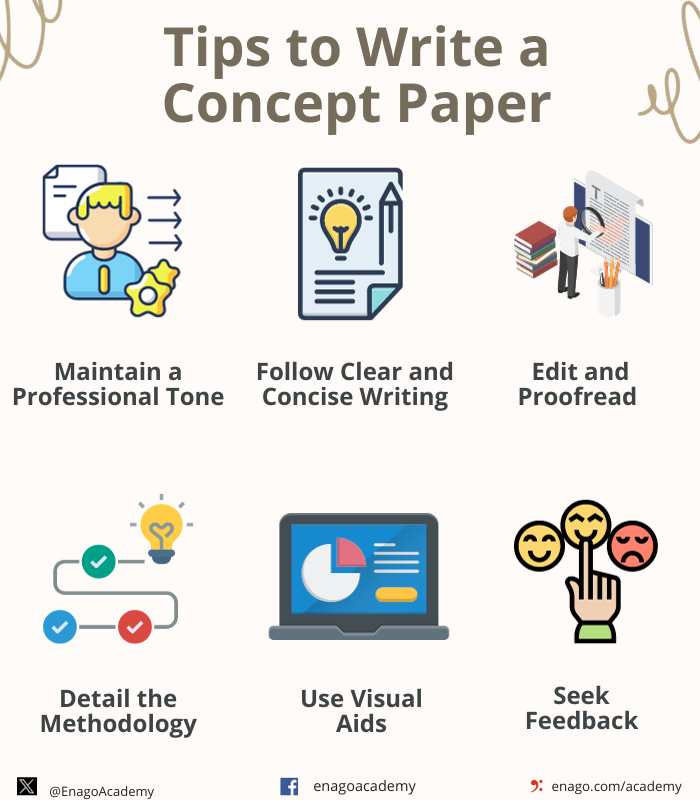

Example of a Concept Paper
Here is an example of a concept paper. Please note, this is a generalized example. Your concept paper should align with the specific requirements, guidelines, and objectives you aim to achieve in your proposal. Tailor it accordingly to the needs and context of the initiative you are proposing.
Download Now!
Importance of a Concept Paper
Concept papers serve various fields, influencing the direction and potential of research in science, social sciences, technology, and more. They contribute to the formulation of groundbreaking studies and novel ideas that can impact societal, economic, and academic spheres.
A concept paper serves several crucial purposes in various fields:
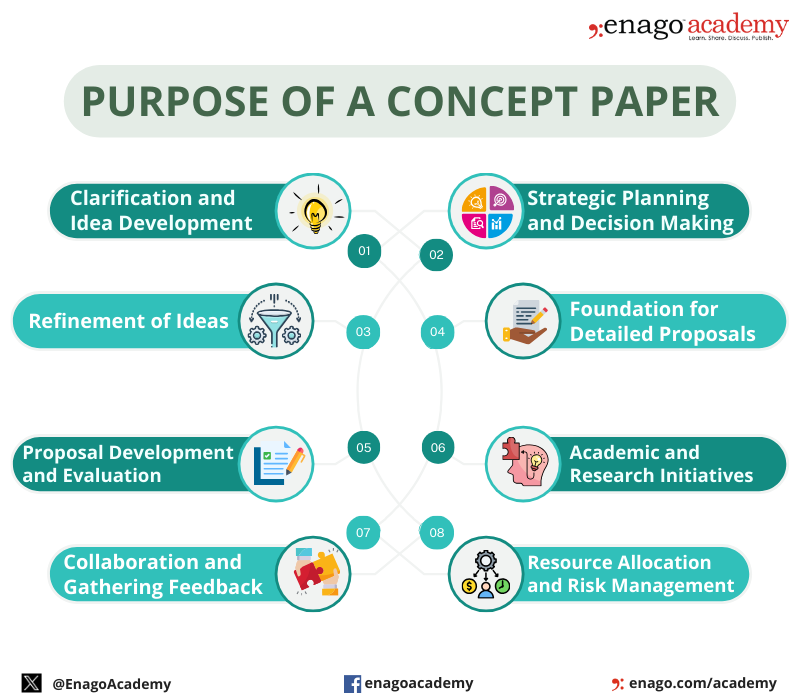
In summary, a well-crafted concept paper is essential in outlining a clear, concise, and structured framework for new ideas or proposals. It helps in assessing the feasibility, viability, and potential impact of the concept before investing significant resources into its implementation.
How well do you understand concept papers? Test your understanding now!
Fill the Details to Check Your Score

Role of AI in Writing Concept Papers
The increasing use of AI, particularly generative models, has facilitated the writing process for concept papers. Responsible use involves leveraging AI to assist in ideation, organization, and language refinement while ensuring that the originality and ethical standards of research are maintained.
AI plays a significant role in aiding the creation and development of concept papers in several ways:
1. Idea Generation and Organization
AI tools can assist in brainstorming initial ideas for concept papers based on key concepts. They can help in organizing information, creating outlines, and structuring the content effectively.
2. Summarizing Research and Data Analysis
AI-powered tools can assist in conducting comprehensive literature reviews, helping writers to gather and synthesize relevant information. AI algorithms can process and analyze vast amounts of data, providing insights and statistics to support the concept presented in the paper.
3. Language and Style Enhancement
AI grammar checker tools can help writers by offering grammar, style, and tone suggestions, ensuring professionalism. It can also facilitate translation, in case a global collaboration.
4. Collaboration and Feedback
AI platforms offer collaborative features that enable multiple authors to work simultaneously on a concept paper, allowing for real-time contributions and edits.
5. Customization and Personalization
AI algorithms can provide personalized recommendations based on the specific requirements or context of the concept paper. They can assist in tailoring the concept paper according to the target audience or specific guidelines.
6. Automation and Efficiency
AI can automate certain tasks, such as citation formatting, bibliography creation, or reference checking, saving time for the writer.
7. Analytics and Prediction
AI models can predict potential outcomes or impacts based on the information provided, helping writers anticipate the possible consequences of the proposed concept.
8. Real-Time Assistance
AI-driven chat-bots can provide real-time support and answers to specific questions related to the concept paper writing process.
AI’s role in writing concept papers significantly streamlines the writing process, enhances the quality of the content, and provides valuable assistance in various stages of development, contributing to the overall effectiveness of the final document.
Concept papers serve as the stepping stone in the research journey, aiding in the crystallization of ideas and the formulation of robust research proposals. It the cornerstone for translating ideas into impactful realities. Their significance spans diverse domains, from academia to business, enabling stakeholders to evaluate, invest, and realize the potential of groundbreaking concepts.
Frequently Asked Questions
A concept paper can be defined as a concise document outlining the fundamental aspects of a grant proposal such as the initial ideas, objectives, and theoretical framework of a proposed research project.
A good concept paper should offer a clear and comprehensive overview of the proposed research. It should demonstrate a strong understanding of the subject matter and outline a structured plan for its execution.
Concept paper is important to develop and clarify ideas, develop and evaluate proposal, inviting collaboration and collecting feedback, presenting proposals for academic and research initiatives and allocating resources.
I got wonderful idea
It helps a lot for my concept paper.
Rate this article Cancel Reply
Your email address will not be published.

Enago Academy's Most Popular Articles

- AI in Academia
AI vs. AI: How to detect image manipulation and avoid academic misconduct
The scientific community is facing a new frontier of controversy as artificial intelligence (AI) is…

- Diversity and Inclusion
Need for Diversifying Academic Curricula: Embracing missing voices and marginalized perspectives
In classrooms worldwide, a single narrative often dominates, leaving many students feeling lost. These stories,…

- Career Corner
- Trending Now
Recognizing the signs: A guide to overcoming academic burnout
As the sun set over the campus, casting long shadows through the library windows, Alex…

Reassessing the Lab Environment to Create an Equitable and Inclusive Space
The pursuit of scientific discovery has long been fueled by diverse minds and perspectives. Yet…

Simplifying the Literature Review Journey — A comparative analysis of 6 AI summarization tools
Imagine having to skim through and read mountains of research papers and books, only to…

Sign-up to read more
Subscribe for free to get unrestricted access to all our resources on research writing and academic publishing including:
- 2000+ blog articles
- 50+ Webinars
- 10+ Expert podcasts
- 50+ Infographics
- 10+ Checklists
- Research Guides
We hate spam too. We promise to protect your privacy and never spam you.
I am looking for Editing/ Proofreading services for my manuscript Tentative date of next journal submission:

As a researcher, what do you consider most when choosing an image manipulation detector?
Academia.edu no longer supports Internet Explorer.
To browse Academia.edu and the wider internet faster and more securely, please take a few seconds to upgrade your browser .
Enter the email address you signed up with and we'll email you a reset link.
- We're Hiring!
- Help Center

Concept Paper: MEDIUM OF INSTRUCTION AND TEACHER-LEARNER INTERACTION

Rationale Language plays significant role inside a learning milieu. If we translate it into learning, we actually construct ideas in language (Vgotsky, 1978). Thus, language policy for medium of instruction in school setting should be made clear for teachers to guide them in achieving the established goals of the Enhanced Basic Education Curriculum through K-12 program.
Related Papers
Aan Fardhani
Abstract: In 2006 - 2012 there wa s a new trend at Junior and Senior High Schools in Indonesian to conduct classes labeled an International Class based on the government decree for Educational Quality Enhancement. “Sekolah Menengah Atas Negeri I Jember” executed this regulation by designing “Kelas Rintisan”(a Pioneering Class) where the instruction of English and Science subjects wa s done in English by the expert teachers. The teacher’s language of instruction wa s intended to design an artificial classroom English “ learning environment” which c ould stimulate the students using their English consciously and unconsciously whiles they aimed to understand the content subjects and communicate with teacher and classmates. The communicative interaction m ight happen when language wa s modified to fit the students’ level of difficulty . T hus the students c ould involve actively in using English. Classroom interactions c ould give direct help to students solv e the breakdown in a commu...
Babcock University Journal of Education
Kehinde Ogunyemi
This paper addressed some important issues involved in the use of language as a tool for effective communication in the classroom. The paper posited that language should not just be used in the classroom to share ideas, knowledge and skills, it must be used in such a way that learners would benefit maximally from classroom instruction. The paper observed that there are some barriers to effective use of language for the purpose of communication in the classroom. Suggestions on how to deal with these barriers and how to ensure effective communication in the classroom were given. The paper also explored the various communication styles adopted by teachers during classroom interactions. It was observed that though teachers may display primary communication styles, there are other secondary communication styles which teachers also adopt depending on the situations they are dealing with.
Dr Muhammad Ilyas Khan
This study was conducted to investigate problems faced by teachers and students in the teaching-learning process using English as the medium of instruction at the primary level. The study explored the teachers’ competencies and students' abilities needed regarding the use of English as a medium of instruction. A survey research design was used to conduct the study. A questionnaire was administered to a sample of 380 randomly selected teachers of 350 primary schools of HazaraChi-Square Chi Square Goodness of Fit Test was used for the data analysis. Findings revealed that most primary school teachers found it difficult to teach different subjects using English as medium of instruction. Teachers did not seem to be able to provide a suitable learning environment for students in the EMI context. In comparison to students who did not seem to face substantial issues in understanding their lessons through EMI, teachers faced more difficulties in the effective use of EMI for their teachi...
Alexander Decker
Approaches to Language in the Classroom Context
Elena de Prada
It offers an overview of language teaching by looking at its theory and practice. It explores how learner’s interlanguage has developed, what it is, how it is formed, what influences it, and so on. It deals with the influence of these ideas on classroom practice with the aim of extracting pointers for the future of instructed second language acquisition.
Joy K Peyton
The question of language of instruction is at the top of the educational agenda in many countries around the world. Decisions about language of instruction (including what mother tongue languages to teach, in what grades, when to transition to the national language or international language) and efforts to develop materials and instructional strategies to support the language(s) selected are well underway. This article reviews a study of language of instruction conducted in the United States that has a rigorous study design and compelling results. Its outcomes and implications can provide helpful guidance for selecting languages of instruction and for planning programs and instruction in contexts around the world. It also raises interesting questions about the impact of context (including time, place, and participants) on implementation of programs and instruction based on research. It concludes with support for the strong design and findings of the study reviewed and, at the same t...
claudia Kaushiweni
The majority of learners in southern Africa receive the ir education through the medium of a second language, English. Although teachers of English play a crucial role in helping learners to acquire language skills in the medium of instruction, we arg ue that subje ct con ten t teach ers' lack of attention to the teaching of the four language skills may be a raison d'être for learners' lack of ac ad em ic achievement. A situation analysis conducted among three study populations examined the extent to which subject content teachers took res po nsibility fo r the teaching of language skills in the content cla ssro om , as well as p ossible reasons for not doing so. It also shed some light on the amount of language teaching that actually took place in a content classroom. The aim of the situation an aly sis was to determine whether there was a need for a specialised training course for English second language m edium of instruction teachers.
Virginia Richardson
Saranya Jayaraj
Journal of Culture and Values in Education
Michelle Haj-Broussard
The purpose of this special issue is to provide a space for scholars to disseminate theory and research about the influence of language in educational contexts. In this issue, we curated articles that address topics related to how language serves as a defining or decisive factor in education and schooling. In our introduction to this special issue, we provide an interpretive overview of the articles and offer an explanation of their relevance for understanding the complex nature of contemporary education. Salient topics include: critical analysis of discourse, linguistic landscapes, Natural Semantic Metalanguage, language ideology, politics and educational funding, funds of knowledge/identity, and definitional caveats related to language learning pedagogies in divergent contexts.
RELATED PAPERS
Neurology India
Sanjeev Thomas
Cuadernos Unimetanos
Laura Margarita Febres
Linda Whiteford
International Journal of Mechanical and Production Engineering Research and Development
Christiane S . Even (née Opfermann)
Nanotechnology Perceptions
Avto Tavkhelidze
Eduarda Santos
International Journal of Medical Research and Review
Umesh Sinha
Experimental and Toxicologic Pathology
riaz hussain
GUALTIERO PALARETI
Journal of Medical Virology
Luciano Luna
veerle hendriks
American Journal of Clinical Pathology
Samuel Robsam Ohayi
JMIR research protocols
Pelle Pelters
Ahmed Mohamed
Pharmacological Research
Gabriella Facciolà
Vania Aparecida Silva Figueiredo Do Couto
RePEc: Research Papers in Economics
elvio accinelli
Noor Latifah
Journal of Colloid and Interface Science
Marja Kallioniemi
Martin Sommerkorn
Siberian Mathematical Journal
Anatoly G. Kusraev
Journal of Clinical Pathology
Nening Dennis
- We're Hiring!
- Help Center
- Find new research papers in:
- Health Sciences
- Earth Sciences
- Cognitive Science
- Mathematics
- Computer Science
- Academia ©2024

IMAGES
VIDEO
COMMENTS
In this concept paper we describe a framework (a 3 x 3 model of 21st-century learning) for guiding our discussion on the substance of STEM education. This framework is based on research conducted by and reported in Kereluik, Mishra, Fanhoe, & Terry (2013). Further details are provided in the end notes. In this concept paper we describe this ...
interpretations it remains heavily contested. (See, for example, Illich, 1974; Postman & Richter, 1998; von Hentig, 1996; Harber, 2004.) The importance of this distinction underpins a paper by Sayed (1997), who argues that „the concept „quality‟ in education is elusive and … frequently used but never defined‟ and goes on
follow these steps: 1. Concept paper title. Every pa per must have a title and concept paper is not left out as one needs to have a title that. summarizes what the paper is about. The title should ...
This series of Oxfam IBIS concept papers define the Oxfam IBIS' understanding and approach in key areas. Each paper contains the following sections: Justifi cation for Oxfam IBIS' work on the issue. Brief overview of relevant theories and definitions. Presentation of Oxfam IBIS' approach and lessons learned. References to further ...
concept by providing knowledge about various dimensions of teaching. Introduction to Education which includes the contributions of academics and researchers aims to provide highest academic achievement in teacher education. The book concludes eight chapters: Fundamental Concepts of Education, Teachers and Teaching, Social Foundation of Education,
Funders that request concept papers often provide a template or format. If templates or formats are not provided, the following can serve as a useful concept paper structure. THE FIVE ELEMENTS OF A CONCEPT PAPER 1. The first section, the Introduction, identifies how and where the applicant's mission and the funder's mission intersect or align.
to interest potential funders. to develop potential solutions or investigations into project ideas. to determine whether a project idea is fundable. to serve as the foundation of a full proposal. Funders that request concept papers often provide a template or format. If templates or formats are not provided, the following can serve as a useful ...
III. Quality Content. Quality content refers to the intended and taught curriculum of schools. National goals for education, and outcome statements that translate those goals into measurable objectives, should provide the starting point for the development and implementation of curriculum (UNICEF, 2000).
Concept paper: Early Childhood Education and Care Context Early childhood education and care (ECEC), as defined by UNESCO, is the "holistic development of a child's social, emotional, cognitive and physical needs in order to build a solid and broad foundation for lifelong learning and wellbeing." Extensive academic
A concept paper is often used to generate feedback and guidance from a program officer before a full grant proposal is developed. In most cases, the program officer will be, or will have been, a researcher, clinician, or scholar, like yourself. Before you start writing, think about the Golden Rule and the kind of project summary you'd like to ...
Oxfam IBIS Concept Paper: Education and Gender, version 1, March 1st, 2017 This series of concept papers was introduced June 1st, 2014 with the target audience being Oxfam IBIS staff and management as well as partners and stakeholders. The papers have been developed through a participatory process and are living documents to be revised whenever ...
Sample Concept Paper for Research Proposal (PDF) This is a concept paper sample provided by Dr. Bernard Lango from the Jomo Kenyatta University of Agriculture and Technology (modified for use in this article). Simply click the link above the download the PDF file. Tips for Writing Your Concept Paper. Use simple, concise language.
Additionally, infographics and scientific illustrations can enhance the document's impact and engagement with the audience. The steps to write a concept paper are as follows: 1. Write a Crisp Title: Choose a clear, descriptive title that encapsulates the main idea. The title should express the paper's content.
View PDF. CONCEPT PAPER ON QUALITY EDUCATION Empowerment for Life (E4L) has a holistic approach to education in particular and to development as a whole. By holistic, it means looking at the whole human being (psychologically, intellectually, physically and morally).
This document provides a concept paper for a research project that aims to analyze the current instructional consultation program and assess students' perceptions of it at a higher education institution. The project objectives are to improve student-teacher relationships and instructional consultation practices in line with institutional goals. Main activities will include distributing ...
The paper posited that language should not just be used in the classroom to share ideas, knowledge and skills, it must be used in such a way that learners would benefit maximally from classroom instruction. The paper observed that there are some barriers to effective use of language for the purpose of communication in the classroom.
A concept paper is meant to give your Department an idea of your area of research interest in order to avail the necessary assistance for you to develop a research proposal. Be as specific as possible in providing information Title of Proposed Study: Background to the Study: (What have you read that has had an impact on your thinking about the ...
Sample Concept Paper Uses for Document ¾ Clarifies and organizes ideas ¾ A pre-proposal (usually 2-4 pages) that describes ... school students through their physical education classes. Initially, _____and other mentors will visit the schools attended by those students enrolled in the
Concept Paper on the The K to 12 Basic Education Curriculum Framework - Free download as Word Doc (.doc / .docx), PDF File (.pdf), Text File (.txt) or read online for free. The Philippines launched its "K to 12" program in 2012, a comprehensive reform of basic education. It is catching up with global standards in secondary education through this reform and attaching high value to the kindergarten.
PDF | On Jun 10, 2010, Edgar Eslit published Concept paper | Find, read and cite all the research you need on ResearchGate
The Five Elements of a Concept Paper. The first section, the Introduction, identifies how and where the applicant's mission and the funder's mission intersect or align. It addresses the reasons why this funder should support projects in this general area. It also introduces the applicant's partners and shows why the partners want to ...
Concept Paper (Revised) - Free download as Word Doc (.doc / .docx), PDF File (.pdf), Text File (.txt) or read online for free. This document discusses the use of technological tools and social media platforms to develop effective instructional materials during the COVID-19 pandemic. It aims to identify the impact of these tools on material ...
Concept Paper. First of three dissertation benchmarks. Is worth 2 credits. Typically 10-12 pages (excluding title page and references) Presents student's proposed research agenda. Represents the first 3 chapters of the dissertation.